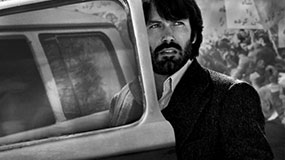
 Well, I can’t say I wasn’t the youngest person in the theatre by about 20 years. It’s not a stretch that Argo, a peek behind the curtain of the Iran hostage crisis of the late 1970s (I’ll wait a second for you to Wikipedia that), would bring out the crowd that experienced the situation first hand on their televisions. That’s also probably why I can’t shake the feeling that I was missing out on part of the experience of this film. You get the sense that all of it would have been a lot more breathtaking if you’d watched it on the news the first time around.
Well, I can’t say I wasn’t the youngest person in the theatre by about 20 years. It’s not a stretch that Argo, a peek behind the curtain of the Iran hostage crisis of the late 1970s (I’ll wait a second for you to Wikipedia that), would bring out the crowd that experienced the situation first hand on their televisions. That’s also probably why I can’t shake the feeling that I was missing out on part of the experience of this film. You get the sense that all of it would have been a lot more breathtaking if you’d watched it on the news the first time around.
The film starts with a quick history of the Persian Empire and continues on to the United States’ decision to harbour the Shah of Iran, the event that sparked the crisis. It’s done with quiet detachment and doesn’t excuse either side for their transgressions in the lead up to the conflict, including the United States’ destructive influence over the region in the years prior.
The first act of the film is near flawless. Director Ben Affleck captures the chaos and uncertainty facing the diplomats inside the embassy as the riots outside turned from bad to worse, eventually spilling into the compound. The film, perhaps to its detriment, is never more tense than in these moments, as the embassy staff realize the helplessness of their situation and the mob takes over. Affleck, wisely through old news footage, does an excellent job later in the film of contrasting the event to some of the public reaction in the United States, which questioned why the Marines guarding the embassy didn’t fire on the crowd. It’s exactly the sort of context these types of films are made for.
Six hostages do escape however, and take refuge in Canadian Ambassador Ken Taylor’s house. From there on the film morphs into the story of how CIA exfiltration specialist Tony Mendez creates an elaborate cover story involving a fake movie named Argo to get the escaped hostages out of Iran before they’re captured. It’s also where the movie starts to experience difficulties.
The story itself is fascinating and completely outrageous, which makes the fact that it’s true that much more awesome. John Goodman (playing real life Academy Award winning makeup artist John Chambers) and Alan Arkin are hilariously likable as they help Affleck’s Mendez go through the process of creating a fake movie. The problem is that when it comes time to actually execute the plan, what would read well in the source material doesn’t necessarily transfer the same way to the screen.
Affleck (along with screenwriter Chris Terrio) fails at times to adequately mine tension from the situation. It’s a difficult task to keep an audience who already knows the ending on the edge of their seats, but too often Argo boils down to just a series of close calls, many of which feel more like dramatic license than history (feel free to correct me if I’m wrong, history buffs).
Much will be made of Canada’s downplayed role in the movie (for those of you who don’t know, Canada played an integral part in getting the hostages out). Certainly Canadian Ambassador Ken Taylor (played by Canadian Victor Garber) deserved a bigger role and much more credit than he got for risking his life and the lives of his wife and staff protecting the hostages. But for those quick to jump on the movie for the apparent slight, remember that the news story was actually the cover up, one that stood for almost 20 years. It wasn’t just Canada and Canada alone who got the hostages out.
Regardless, the film seems to lack the heft of Affleck’s earlier projects, perhaps due to difficulties in adapting the real life source material. While Argo is certainly a good film, both funny and interesting, I would stop short of calling it a great film. Still, the Iran hostage crisis is a captivating little slice of history so, if you’re interested, I suggest seeing it for yourself.
